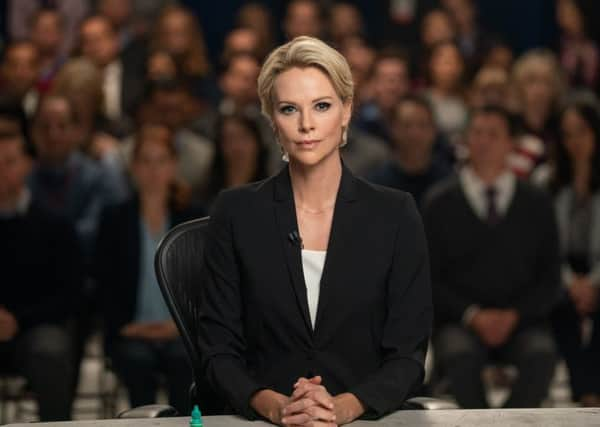Film reviews: Bombshell | A Hidden Life | Just Mercy | Be Natural: The Untold Story of Alice Guy-Blaché | Weathering With You


Bombshell (15) ***
A Hidden Life (12A) **
Just Mercy (12A) **
Be Natural: The Untold Story of Alice Guy-Blaché (PG) ***
Weathering With You (12A) ***
A year before the Harvey Weinstein revelations, another loathsome and predatory power-player, Fox News CEO Roger Ailes, was hoisted with his own petard. Successfully sued by former anchor Gretchen Carlson, and swiftly fired by Rupert Murdoch, he may have died in 2017 before the #MeToo movement kicked into gear, but he’s become a useful symbol of the sort of pathologically misogynistic corporate management style that has since been called out for normalising sexual misconduct. Already in the last few months his case has been dramatised in the Golden Globe-winning mini series The Loudest Voice and now here it is again, forming the basis of the Jay Roach-directed/Charlize Theron-produced Bombshell, which appropriates the seriocomic stylings of The Big Short (they share a screenwriter in Charles Randolph) to mix fact, fiction and real-life testimony into a sometimes powerful, sometimes sketchy, sometimes compellingly horrifying dramatisation of the rot running through the entire culture.
Though Carlson’s lawsuit (she’s played with steely poise by Nicole Kidman) lit the fuse of this particular story, Bombshell is much more focused on fellow anchor Megyn Kelly, whose initial silence about Ailes (John Lithgow) is tied up with her conflicted feelings about her own career and the public vitriol she experienced when she held Donald Trump to account for his repugnant views on women during the 2016 presidential primaries. The film kicks off with that event, which helps generate empathy for a group of women who decried feminism and played by the rules of corporate America, yet still got burned. The film also brings the malignant effect of these toxic power structures into sharp relief with the arrival of Margot Robbie’s Kayla, an ambitious fledgling reporter who – in the film’s most uncomfortable and sensitively handled scene – learns the hard way about the sacrifices women have to make to Ailes if they’re to have any hope of progressing in his company.
Advertisement
Hide AdHere Lithgow is particularly good at exuding a kind of impotent odiousness. That said, it feels a little problematic that Kayla is a fictional character. Although she’s meant to embody the experiences of numerous real life Fox News employees that didn’t have the profile of Kelly or Carlson, the fact that the film also includes actual talking-head testimonials from former employees raises an issue about what’s verifiable in a movie designed as a primer on the importance of believing women.
The more prolific Terrence Malick becomes, the more ponderous and dull his movies seem to get. A Hidden Life continues that general navel-gazing trend. Its subject matter may be weightier than recent efforts, but his wispy, portentous style is no longer enough to elevate his hinted-at themes into a profound, or even half-way coherent film.
Beginning in the Edenic Austrian mountain village of St Radegund, the based-on-true-events story follows the Christ-like suffering of conscientious objector Franz Jägerstätter (August Diehl) as his refusal to pledge allegiance to Hitler leads first to social ostracisation, then incarceration. Malick’s use of an epistolary structure tunes us in to the whispered thoughts of Franz and his devoted wife, Fani (Valerie Pachner), but their letters merely illuminate things Malick is showing us on screen and there’s a dispiriting lack of conviction in the artistry of the endeavour when he has all the characters address each other in heavily accented English, except the Nazis, who SHOUT AND SCREAM IN GERMAN. True, it does feature lots of beautifully shot scenes of villagers toiling in wheat fields (a common Malick trope), but at over three hours there’s a lot of chaff too.
Despite boasting a great cast and exploring an important story, bland direction and one-note characterisation relegate legal drama Just Mercy to the awards season bargain bin. Michael B Jordan takes the lead as Bryan Stevenson, an idealistic lawyer who has dedicated himself to representing death row convicts in Monroeville, Alabama, the real-life setting of Harper Lee’s To Kill A Mockingbird. The ironies of that association are dispensed with pretty quickly as the film homes in on Stevenson’s efforts to overturn the wrongful conviction of Walter McMillian (Jamie Foxx) for the 1986 murder of a white woman. Sadly, the film quickly descends into John Grisham territory.
In a week in which women were shut out of the best director category in this year’s Oscar nominations, the timing of Be Natural: The Untold Story of Alice Guy-Blaché couldn’t be better. Tracing the story of the first ever female director, Pamela B Green’s fascinating, Jodie Foster-narrated doc uncovers a remarkable story of an innovative filmmaker who was there at the dawn of cinema in France, co-founded her own studio in Hollywood and directed more than 1,000 films that helped pioneer narrative storytelling, technical innovation and went on to influence luminaries such as Hitchcock and Eisenstein. The film’s exhaustive (and occasionally exhausting) investigation into her life and legacy uncovers plenty of maddening instances of sexism as she was literally written out of the history books, but it also highlights the concerted efforts of archivists and historians to start setting the record straight. This film is a good introduction to that effort.
The team behind the 2016’s smash hit anime Your Name return with Weathering With You, another heightened teenage love story told against the backdrop of an impending ecological disaster. Stunningly animated and trippily outré in its narrative choices, the film isn’t quite as compelling as its predecessor, but its commitment to its own bleak story is admirably daring and more grown-up than its upbeat J-pop soundtrack initially suggests.